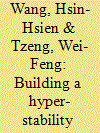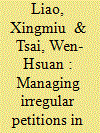| Srl | Item |
| 1 |
ID:
177740


|
|
|
|
|
| Summary/Abstract |
Having been a stable authoritarian regime for more than seven decades, China is an excellent example of how authoritarian regimes can resist pressure from a rapidly transforming society. Its capacity to adapt to social change and maintain a strong hold on power has been observed by students of Chinese politics in the nature of its institutions. These include fragmented governments, decentralization, flexible governance, adaptive capacity, consultative functions, bargained mechanisms, and responsiveness. Xi Jinping’s rise to power and the introduction of information and communications technology (ICT) in recent years have brought about the evolution of the Chinese Communist Party’s methods for governing society. Changes in its governing strategy have merited a review of our understanding of the Chinese regime and inspired an investigation into how social stability is maintained in China. In this paper, we review previous descriptions of China’s authoritarianism and observe the policies the Xi regime has adopted to strengthen state power. We propose that for the purposes of social control, the Xi administration has been building a hierarchical state machine and expanding this machine to the digital sector of society, a campaign which we call “institutional autocratization.” These efforts to establish a hyper-stability structure with new technologies may indeed have strengthened Xi’s rule.
|
|
|
|
|
|
|
|
|
|
|
|
|
|
|
|
| 2 |
ID:
165223


|
|
|
|
|
| Summary/Abstract |
This paper uses Province A and City T as case studies to explore the strategies used by the Chinese Communist Party (CCP) for managing citizens’ “irregular letters and visits” (irregular petitions) and the logic behind them. We believe that the local officials use both “hard” and “soft” measures to exercise control over these activities. The soft measures include persuasion and negotiation aimed at getting petitioners to abandon their irregular petitions. The hard measures involve the use of the coercive power of the state to compel the petitioners to return home. During important political meetings and holiday periods, both of which are popular times for petitioning, the CCP is more likely to take a hard approach to resolve serious problems and maintain stability. In normal times, it generally uses less costly soft tricks. These two social control strategies are utilized alternately by the CCP to maintain social stability and guarantee its regime survival.
|
|
|
|
|
|
|
|
|
|
|
|
|
|
|
|